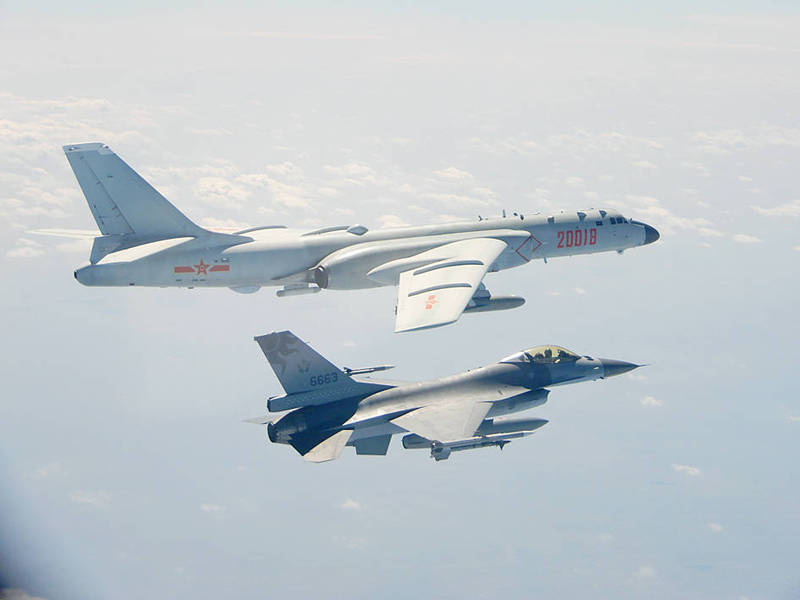A Chinese H6 bomber, top, flies over the Bashi Channel near Taiwan as a Taiwanese F-16 approaches on Feb. 10, 2020. Photo: EPA-EFE / Ministry of National Defense
/ AFP, TAIPEI
Chinese warplane incursions into Taiwan's air defense identification zone nearly doubled last year, with a surge in fighter jet and bomber sorties as Beijing intensified threats toward the nation.
Relations have been icy for years under Chinese President Xi Jinping (Xi Jinping), but last year saw a deeper deterioration, as Xi's military ramped up incursions and launched the largest war games in decades to protest against a visit by US House of Representatives Speaker Nancy Pelosia in August.
China sent 1,727 planes into Taiwan's air defense identification zone last year, according to a database based on daily updates released by the Ministry of National Defense.
That compares with about 960 incursions in 2021 and 380 in 2020.
Fighter jet sorties more than doubled from 538 in 2021 to 1,241 last year, while incursions by bombers, including the nuclear-capable H6, increased from 60 to 101.
Last year also witnessed the first incursions by drones, with all 71 reported by the military coming after Pelosi's visit.
Military analysts say China has used the incursions to probe Taiwan's defenses, exhausting its aging air force and voice disturbance over US support for Taipei.
The Chinese “want to show their determination, their will and to coerce the United States: don't get too close to their red lines, don't cross their red lines,” former chief of the general staff Admiral Lee Hsi-ming ( Li Ximing) said.
The US recognizes China over Taiwan diplomatically, but remains Taipei's most important ally.
It opposes any forced change to Taiwan's status and is bound by the Taiwan Relations Act to supply the nation with the means to defend itself.
Support for Taiwan is a rare issue of bipartisan consensus in Washington and there has been growing alarm over whether China might resort to a military solution, a fear heightened by Russia's invasion of Ukraine.
Washington has maintained a policy of “strategic ambiguity” toward Taiwan, deliberately making no firm commitment on whether it would come to its defense.
That strategy was aimed at making Beijing think twice about the costs of any invasion, and also to deter Taiwan from formally declaring independence.
US President Joe Biden has been mercurial on the issue of strategic ambiguity.
He has repeatedly said US troops would come to Taiwan's aid in the event of a Chinese invasion, only for the White House to walk back his comments.
China has used warplane incursions to voice its displeasure about specific events. It sent 71 warplanes to conduct a “strike exercise” on Dec. 25 in response to what it described as “escalating collision and provocations” by Washington and Taipei.
That came days after Biden signed off on up to US$10 billion in military aid to Taiwan.
August saw a record 440 sorties by Chinese warplanes, the same month Pelosi became the highest-ranking US lawmaker to visit Taiwan in 25 years.
News source: TAIPEI TIMES
